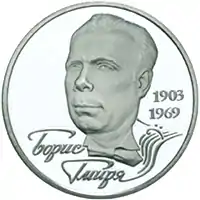Borys Hmyria
Borys Romanovych Hmyria (Ukrainian: Борис Романович Гмиря), also known as Boris Romanovich Gmyrya[1](Russian: Борис Романович Гмыря; August 5 [O.S. July 23] 1903 – August 1, 1969) PAU, was a Soviet and Ukrainian bass singer of opera and art song.

Biography
Hmyria was born in 1903 in Lebedin, Kharkov Governorate, Russian Empire (today part of Ukraine). He remained in Poltava during World War II where he performed for the Germans. This kind of behavior was considered collaboration with the enemy by Soviet authorities. Hmyria would have been imprisoned and executed[2] had it not been for Joseph Stalin's intervention. Hmyria's partner, Valentina Ishchenko, was exiled to Vorkuta in the Komi ASSR.
He died in Kiev in 1969.
Friendship with Shostakovich
Hmyria was a friend of Dmitri Shostakovich and often performed his Five Romances on Verses by Yevgeny Dolmatovsky in concert, although their friendship came under strain because of mutual perceived slights and their contrasting personalities.[3]
During the summer of 1962, Shostakovich was completing his Thirteenth Symphony; the bass soloist part had been composed with Hmyria's voice in mind. The singer was reluctant to commit accepting the responsibility of singing the premiere performance, despite the composer's repeated urging. On August 15, Hmyria declined the assignment citing his objections to Yevtushenko's verses, but attended the premiere performance on December 18. After the concert, Hmyria wrote: "This evening I listened to Shostakovich's Thirteenth Symphony. My greatest impressions: 'Babi Yar,' 'In the Shop.'"[4]
References
- "Benders Will Host Evening of Music". San Luis Obispo County Telegram-Tribune. March 29, 1962. Archived from the original on September 2, 2022. Retrieved September 1, 2022 – via Newspapers.com.
- Dmytro Hnatyuk, Dmitry Gordon (2003). "Dmytro Hnatyuk interview" ("Television production") (in Ukrainian). Retrieved 2016-01-29.
- Khentova, Sofia (1986). Шостакович на Украине (in Russian). Kiev, Ukrainian SSR: Музична Украiна. pp. 82–83.
- Khentova 1986, pp. 83–89.
External links
- Borys Hmyria at IMDb
- Biography and sound clips on cantabile-subito.de
- Borys Hmyria discography at Discogs
- Vzyav by ya bandura (If I played the bandura) - folk song
- Divlyus' ya v nebo (I marvel at the heavens)
- https://www.youtube.com/watch?v=sBAFOC8GNZE
- https://www.youtube.com/watch?v=MKUDGzpPtPU
- Ya Vas lyubil (I loved you) (Alexander Dargomyzhsky)